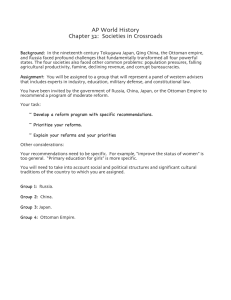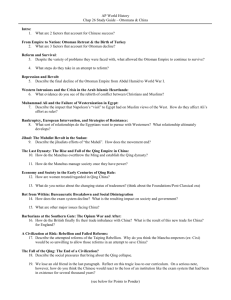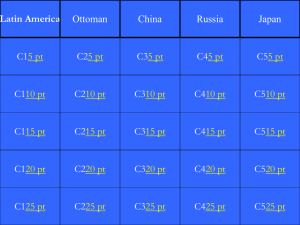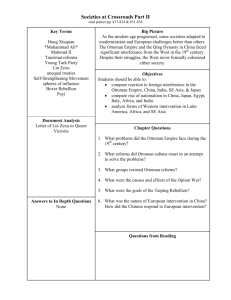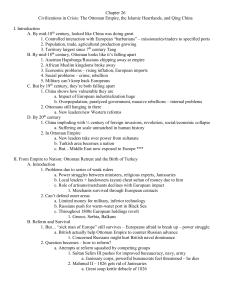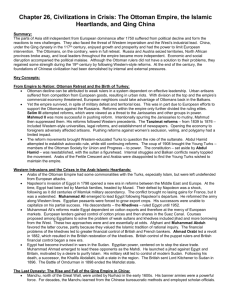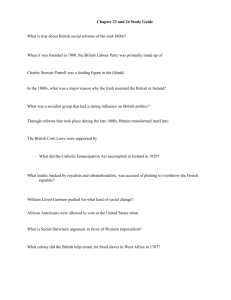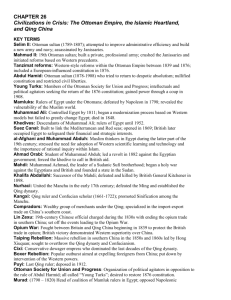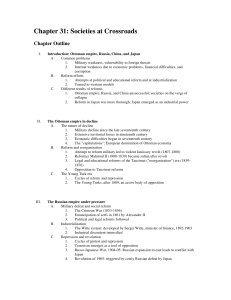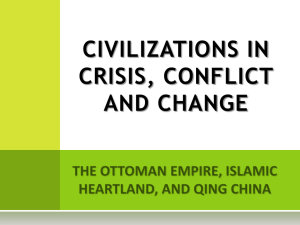doc - The AP World History Podcast
advertisement
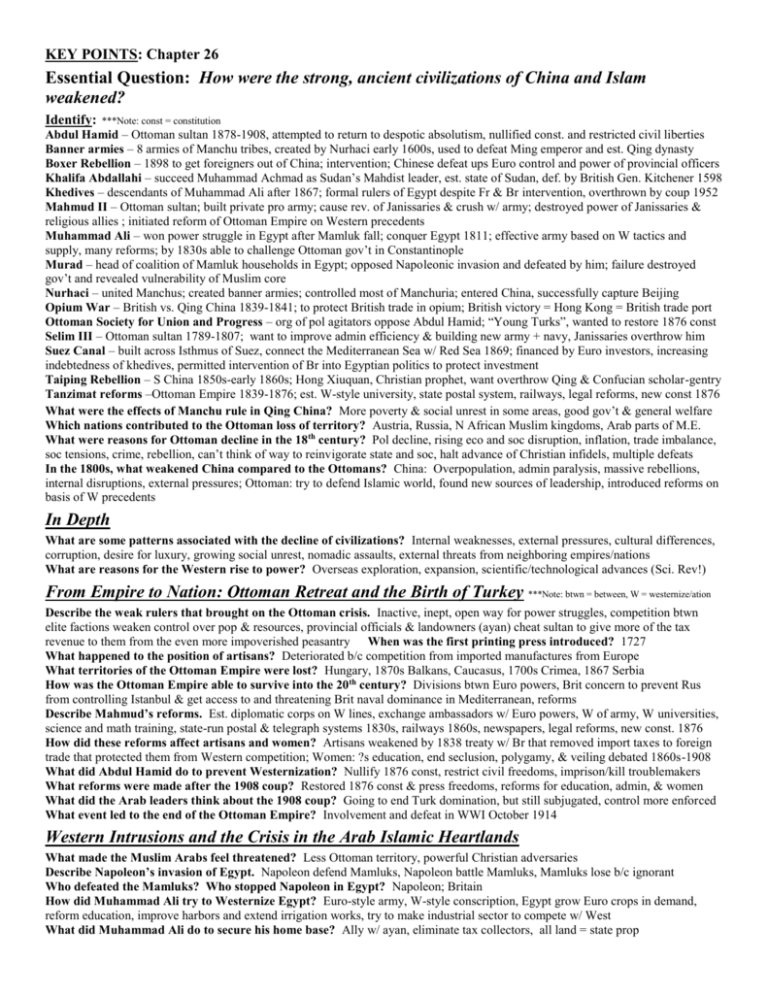
KEY POINTS: Chapter 26 Essential Question: How were the strong, ancient civilizations of China and Islam weakened? Identify: ***Note: const = constitution Abdul Hamid – Ottoman sultan 1878-1908, attempted to return to despotic absolutism, nullified const. and restricted civil liberties Banner armies – 8 armies of Manchu tribes, created by Nurhaci early 1600s, used to defeat Ming emperor and est. Qing dynasty Boxer Rebellion – 1898 to get foreigners out of China; intervention; Chinese defeat ups Euro control and power of provincial officers Khalifa Abdallahi – succeed Muhammad Achmad as Sudan’s Mahdist leader, est. state of Sudan, def. by British Gen. Kitchener 1598 Khedives – descendants of Muhammad Ali after 1867; formal rulers of Egypt despite Fr & Br intervention, overthrown by coup 1952 Mahmud II – Ottoman sultan; built private pro army; cause rev. of Janissaries & crush w/ army; destroyed power of Janissaries & religious allies ; initiated reform of Ottoman Empire on Western precedents Muhammad Ali – won power struggle in Egypt after Mamluk fall; conquer Egypt 1811; effective army based on W tactics and supply, many reforms; by 1830s able to challenge Ottoman gov’t in Constantinople Murad – head of coalition of Mamluk households in Egypt; opposed Napoleonic invasion and defeated by him; failure destroyed gov’t and revealed vulnerability of Muslim core Nurhaci – united Manchus; created banner armies; controlled most of Manchuria; entered China, successfully capture Beijing Opium War – British vs. Qing China 1839-1841; to protect British trade in opium; British victory = Hong Kong = British trade port Ottoman Society for Union and Progress – org of pol agitators oppose Abdul Hamid; “Young Turks”, wanted to restore 1876 const Selim III – Ottoman sultan 1789-1807; want to improve admin efficiency & building new army + navy, Janissaries overthrow him Suez Canal – built across Isthmus of Suez, connect the Mediterranean Sea w/ Red Sea 1869; financed by Euro investors, increasing indebtedness of khedives, permitted intervention of Br into Egyptian politics to protect investment Taiping Rebellion – S China 1850s-early 1860s; Hong Xiuquan, Christian prophet, want overthrow Qing & Confucian scholar-gentry Tanzimat reforms –Ottoman Empire 1839-1876; est. W-style university, state postal system, railways, legal reforms, new const 1876 What were the effects of Manchu rule in Qing China? More poverty & social unrest in some areas, good gov’t & general welfare Which nations contributed to the Ottoman loss of territory? Austria, Russia, N African Muslim kingdoms, Arab parts of M.E. What were reasons for Ottoman decline in the 18 th century? Pol decline, rising eco and soc disruption, inflation, trade imbalance, soc tensions, crime, rebellion, can’t think of way to reinvigorate state and soc, halt advance of Christian infidels, multiple defeats In the 1800s, what weakened China compared to the Ottomans? China: Overpopulation, admin paralysis, massive rebellions, internal disruptions, external pressures; Ottoman: try to defend Islamic world, found new sources of leadership, introduced reforms on basis of W precedents In Depth What are some patterns associated with the decline of civilizations? Internal weaknesses, external pressures, cultural differences, corruption, desire for luxury, growing social unrest, nomadic assaults, external threats from neighboring empires/nations What are reasons for the Western rise to power? Overseas exploration, expansion, scientific/technological advances (Sci. Rev!) From Empire to Nation: Ottoman Retreat and the Birth of Turkey ***Note: btwn = between, W = westernize/ation Describe the weak rulers that brought on the Ottoman crisis. Inactive, inept, open way for power struggles, competition btwn elite factions weaken control over pop & resources, provincial officials & landowners (ayan) cheat sultan to give more of the tax revenue to them from the even more impoverished peasantry When was the first printing press introduced? 1727 What happened to the position of artisans? Deteriorated b/c competition from imported manufactures from Europe What territories of the Ottoman Empire were lost? Hungary, 1870s Balkans, Caucasus, 1700s Crimea, 1867 Serbia How was the Ottoman Empire able to survive into the 20th century? Divisions btwn Euro powers, Brit concern to prevent Rus from controlling Istanbul & get access to and threatening Brit naval dominance in Mediterranean, reforms Describe Mahmud’s reforms. Est. diplomatic corps on W lines, exchange ambassadors w/ Euro powers, W of army, W universities, science and math training, state-run postal & telegraph systems 1830s, railways 1860s, newspapers, legal reforms, new const. 1876 How did these reforms affect artisans and women? Artisans weakened by 1838 treaty w/ Br that removed import taxes to foreign trade that protected them from Western competition; Women: ?s education, end seclusion, polygamy, & veiling debated 1860s-1908 What did Abdul Hamid do to prevent Westernization? Nullify 1876 const, restrict civil freedoms, imprison/kill troublemakers What reforms were made after the 1908 coup? Restored 1876 const & press freedoms, reforms for education, admin, & women What did the Arab leaders think about the 1908 coup? Going to end Turk domination, but still subjugated, control more enforced What event led to the end of the Ottoman Empire? Involvement and defeat in WWI October 1914 Western Intrusions and the Crisis in the Arab Islamic Heartlands What made the Muslim Arabs feel threatened? Less Ottoman territory, powerful Christian adversaries Describe Napoleon’s invasion of Egypt. Napoleon defend Mamluks, Napoleon battle Mamluks, Mamluks lose b/c ignorant Who defeated the Mamluks? Who stopped Napoleon in Egypt? Napoleon; Britain How did Muhammad Ali try to Westernize Egypt? Euro-style army, W-style conscription, Egypt grow Euro crops in demand, reform education, improve harbors and extend irrigation works, try to make industrial sector to compete w/ West What did Muhammad Ali do to secure his home base? Ally w/ ayan, eliminate tax collectors, all land = state prop Describe the economy of Egypt under the khedives. Great expansion of cotton production make dependent on 1 export, revenue wasted on luxury or fruitless military campaigns What transformed Egypt into one of the most strategic places on earth? Suez Canal What were some philosophies during khedival rule? Islamic civ once taught Euros science and math like Indian numerals, so that means that Muslims should learn Euro advances that had been made w/ help of Islamic borrowings, rational inquiry, Quran not the source of all truth and should not be interpreted literally What did Ahmad Orabi do? Led revolt b/c khedive tried to save $$ by disbanding regiments and dismissing officers What roles did the British play in Egypt’s government? Consuls ruling thru puppet khedives, advisors, finance and foreign affairs Why didn’t Sudanic tribes want to be dominated by Egypt? Egyptian regime corrupted, heavy taxes, favor some tribes more than others, tried to eradicate slave trade when that was a huge source of income Who was Muhammad Achmad? The “Mahdi”/ promised deliverer, revolt against Egyptian heretics & British infidels What was the purpose of the jihad in the Sudan? Purify Islam of superstitious beliefs & degrading practices accumulated over yrs What were some policies of Khalifa Abdallahi? Strong expansive state, no smoking/dancing/alcohol, theft/prostitution/adultery severely punished, Islamic religious and ritual practices enforced rigorously, most foreigners imprisoned/expelled, no ban on slavery Why was the Islamic religion threatened? The Last Dynasty: the Rise and Fall of the Qing Empire in China In what ways did the Manchus adopt Chinese culture? Bureaucracy, court ceremonies, scholar-gentry How did the Manchus conquer China? Weak Ming regime, so opportunity to seize control of China; 1644 call Manchu to help put down a widespread rebellion near the Great Wall, exploited political divisions and social unrest, came to Beijing and captured in a yr What did the Manchus do to keep the Chinese people happy? Kept Ming political system, same scholar-gentry, exam system Describe Chinese society in the early centuries of Qing rule. Hierarchy system, extended family is the core unit, women confined to household, elder men dominant b/c family pressures and state, guys can choose wives of families slightly lower than them, daughter less desirable than son b/c dowry when get married, female infanticide, widow remarriage, bigger gap rich vs. poor Describe Chinese economy at that time. Taxes and state labor demands lowered; repaired dikes, canals, roadways, irrigation works; peasants plant new crops per year, regional diversification of crops, dev. of new ways to finance artisan and agri production, big profit from influx of silver; exports: tea, porcelain, silk textiles; Euro traders come to Canton, Chinese free to go anywhere How was the bureaucracy corrupted? Cheating, favoritism, bribery What was revenue used for instead of state projects and what were the effects of that? Given to enrich individual families, bad maintenance of army & navy, bad military training, less public works projects, disrepair of dikes etc. Describe the peasantry in the late 18th century. Food shortages, landlord demands, mass migrations, vagabonds, beggars, bandits Why was overpopulation a problem? Soc and eco systems unable to carry such a large pop unlike the past, need new technology!!! In what ways did China and European nations differ? China: large, overpopulated, backward in tech; Euro: small, populous but not too populous, very advanced technology What did the British export from the Chinese Empire? Silks, fine porcelains, tea, etc. What did China want in return for the imported items? Silver and opium What was wrong with the British exchange of opium with China? Make them have less $ b/c spend on more opium, less silver, bureaucrats crazy and high on drugs, admin addicted to it and don’t care about it Who was Lin Zexu and what did he do? High-quality Qing official, incorruptible, blockaded Canton port, search warehouses, destroyed all the opium that was found What countries established ports on the Chinese coast? Britain. France, Germany, Russia, USA What were the results of China’s defeat in the Opium War? Foreign trade and customs overseen by British officials, Br careful to ensure Euro nationals favored access to China’s market and no protective tariffs, Chinese forced to accept Euro ambassadors as equals What reforms did the Taiping Rebellion offer? Social reforms, land redistribution. liberation of women, attack Confucian elite Who was Zeng Guofan and what did he do? Honest and able Qing official; root out corruption in bureaucracy and revive dead eco What reforms did honest and able Qing officials make? Encouraged W investment in railways & factories, other movements crushed, banditry brought down for a while How were China’s hopes for reform crushed in the late Qing Dynasty? Cixi, ultraconservative dowager empress, imprisoned nephew the emperor in Forbidden City, executed/driven reformers from China, rechanneled funds to build warship to build marble boat in the lake of her imperial garden What secret societies resisted the Qing? Triads, Society of Elders and Brothers, White Lotus What were the goals of these secret society members? Get rid of Manchus, new W China as a nation-state not imperial dynasty Describe the fall of the Qing Dynasty. 1911: Secret society uprisings, student demonstrations, mutinies in imperial troops; 1912: Puyi, last Qing emperor deposed What Confucian ideas were abandoned after the fall of the Qing? Exam system, massive civil bureaucracy, scholar-gentry elite rule, artistic accomplishments
